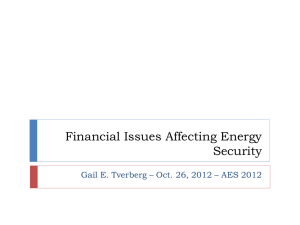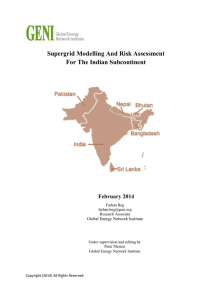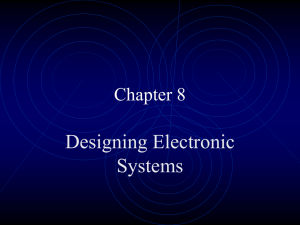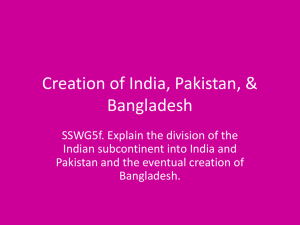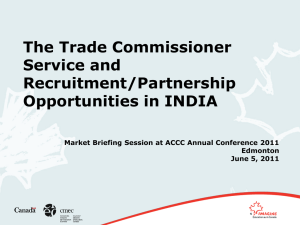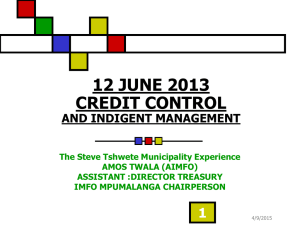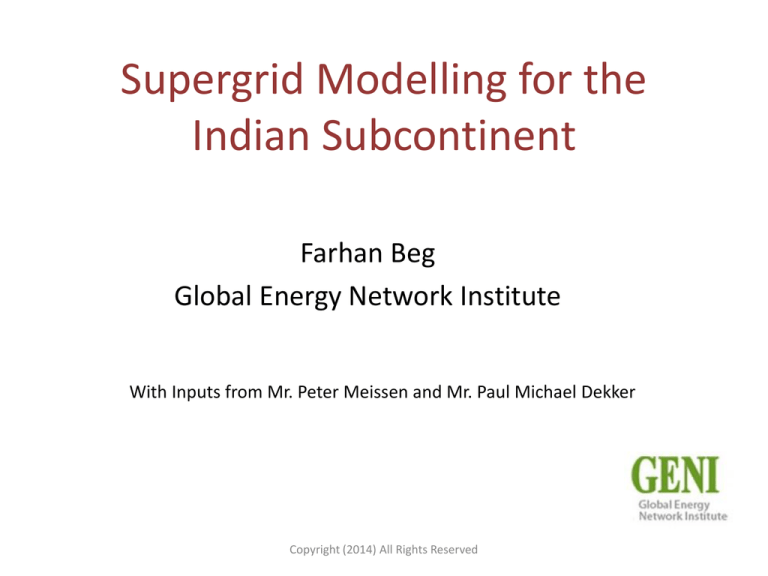
Supergrid Modelling for the
Indian Subcontinent
Farhan Beg
Global Energy Network Institute
With Inputs from Mr. Peter Meissen and Mr. Paul Michael Dekker
Copyright (2014) All Rights Reserved
Supergrid
• High Voltage Energy Corridor that is based on an
HVDC transmission network
• Carries large quantities of power across long
distances and between countries
• Capability of integrating renewable energy into the
grids
Copyright (2014) All Rights Reserved
The European Supergrid
European Supergrid with proposed renewable integration from Northern Africa
consisting of a meshed grid structure
Copyright (2014) All Rights Reserved
Source: www.earthtimes.org
Scope of the Supergrid Deployment
• Large Renewable Energy Potential is located in the
Indian Subcontinent
– Not in Immediate Proximity to Load centers
• Strong need to integrate the renewable energy into
existing electricity grid
– Curb the energy shortages
– Improve quality of electricity
– Regulate the price of electricity
Copyright (2014) All Rights Reserved
Energy Transfer from Generation to
Demand Locations
Cluster of
load centers
Cluster of
generation
centers
[Farhan Beg 2014]
Positive Energy Gradient from east to west
Positive Load Gradient from west to east
Copyright (2014) All Rights Reserved
What will it look like?
[Farhan Beg 2014]
The proposed draft model of the Supergrid for the Indian subcontinent
Copyright (2014) All Rights Reserved
Need based Assessment of the
Member Countries
• Scale and complexity of the project
• Huge variation of economic and cultural trends
across the subcontinent
• Individual member countries’ needs have to be
respected
Copyright (2014) All Rights Reserved
Energy Assessment of India
Renewables
Coal
Diesel
Gas
Hydro
Nuclear
12%
2%
19%
57%
9%
1%
• Shortage of coal at Coal based
generating plants
• Refining and extraction of Coal
does not match the coal
utilization factor of the plants
• Import of Gas not a feasible
option.
• Renewable energy resources
far from the load centers.
Figure: Electricity Generation from different sources
(2011) [Farhan Beg 2014]
Copyright (2014) All Rights Reserved
Energy Assessment of Pakistan
1%
33%
Fossil Fuels
Nuclear Fuels
Hydro power
Renewable
2%
64%
• Electricity supply is highly
unreliable.
• Load shedding and power
outages are a common
scene every day.
• Energy
shortages
at
generating stations
Figure: Electricity Generation from different sources
(2011) [Farhan Beg 2014]
Copyright (2014) All Rights Reserved
Pakistan’s Supply/Demand
Inconsistency
Source: EIA Annual Report, Energy trends
Pakistan’s supply side has seen no growth over the years with the
demand increasing consistently
Copyright (2014) All Rights Reserved
Location of Sindh Valley
[Farhan Beg 2014]
Total Wind Potential of Pakistan is 150 GW
Wind Potential of the Sindh Valley is 50 GW
Sindh valley has been identified as a potential Wind Energy source for
integration into the supergrid for the power flow analysis
Copyright (2014) All Rights Reserved
Pakistan Wind Resources
Copyright (2014) All Rights Reserved
Energy Assessment of Bhutan
• As of 2012, only about 70% of
households had access to electricity
• Hydro power potential of around
30GW
• Exports more than 75% of
hydroelectricity to India
• Developmental goals based on
foreign exchange from the export of
hydro power.
Source: www.nrel.gov
Figure: Bhutan Total Electricity Exports
Source: www.tudorancea.com
Copyright (2014) All Rights Reserved
Energy Assessment of Bangladesh
Source: wikipedia.org/bangladeshelectricity
Figure: Bangladesh location
Source: Wikipedia.org/bangladesh
Copyright (2014) All Rights Reserved
Electricity Generation Capacity of Bangladesh
7000
6000
5000
4000
MW
3000
2000
1000
0
2000
2002
2004
2006
2008
2012
Electricity capacity will be nearly 10,000 MW by 2020, which is
far from the estimated demand of 15000 MW.
[Farhan Beg 2014]
Copyright (2014) All Rights Reserved
Energy Assessment of Sri Lanka
• Sri Lanka has total identified hydro
power potential of 2GW out of
which nearly 1.5GW has already
been harnessed
• Energy demand will outpace
energy generated in Sri Lanka in
the next 20 years.
Source: www.wikipedia.org/srilanka
Copyright (2014) All Rights Reserved
Energy Assessment of Nepal
• Overall fuel wood supplies
nearly 80% of energy
consumption.
• Total potential of
electricity generation
about 83GW
• Potential tapped 0.28GW
• 40% of households have
access to electricity
Source: energy4livelihood.com
Copyright (2014) All Rights Reserved
Country-wise Potential/Tapped
Estimated in MW
Wind Resource
Developed in MW
Hydro Resource
2500
469
20000
613
1500
218
102000 150000
755
23670 32000
Copyright (2014) All Rights Reserved
2000
[Farhan Beg 2014]
Supergrid Modelling
• Provide an electricity highway for the flow of
electric power between nations
• Provide a capability to interconnect the
asynchronous transmission systems of the
subcontinent
• Efficiently control the exchange of seasonally
varying production and storage capacities.
Copyright (2014) All Rights Reserved
State of Technology
• Three-Phase AC technology 50 Hz (AC grids)
with voltages >400 kV (750 kV, 1000 kV)
• Three-Phase AC technology with reduced
frequency (AC grids 16 2/3 Hz) with voltages
>400 kV
• High Voltage Direct Current Transmission
Power transfer equation
P=𝑉1*𝑉2*𝑆𝑖𝑛(𝛿)
2*𝜋*𝑓𝑟𝑒𝑞𝑢𝑒𝑛𝑐𝑦
Copyright (2014) All Rights Reserved
Increase in Transmission Voltage Levels
Source: PowerGrid Corporation of India Limited
Copyright (2014) All Rights Reserved
Synchronous System Connections
Asynchronous System Connections
Multi Terminal DC Connections
Two choices of connections
• Series
• Parallel
Generator
Transmission Line
Converter Station
[Farhan Beg 2014]
Figure: Parallel multi terminal DC connections for the Supergrid.
Copyright (2014) All Rights Reserved
Power Flow Analysis
• A tool to obtain the best working
conditions for an interconnected
system.
• Conditions are obtained by
solving the voltage and current
balance equations at the nodes.
• For DC network the power flow
is simpler.
[Farhan Beg 2014]
Copyright (2014) All Rights Reserved
Draft Model of the Supergrid
{Farhan Beg 2014}
Copyright (2014) All Rights Reserved
Supergrid Modelling
AC/DC Buses
[Farhan Beg 2014]
Copyright (2014) All Rights Reserved
For any inquiries, please contact the author at
farhan.beg@geni.org
Farhan Beg is a power engineer from the
National Institute of Technology, Srinagar,
India and is a researcher at the Global Energy
Network Institute, San Diego, CA, USA
This is an ongoing research project
at the Global Energy Network
Institute, San Diego, CA, USA
For a detailed analysis of the supergrid modelling and the technical
concepts please visit the report “Supergrid Modelling and Risk
Assessment for the Indian Subcontinent” at www.geni.org
Copyright (2014) All Rights Reserved

